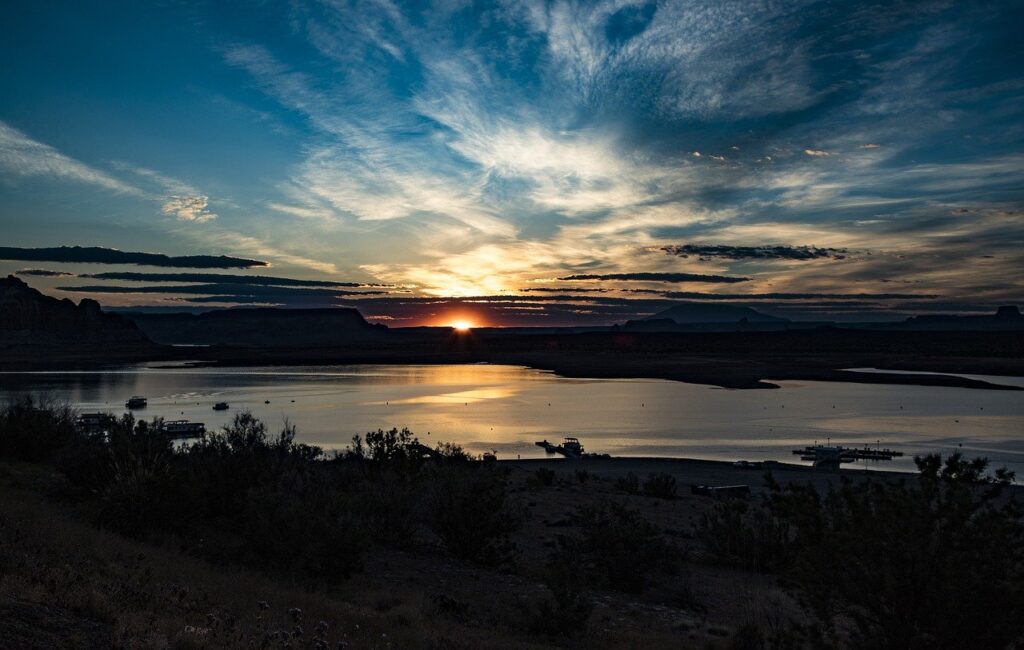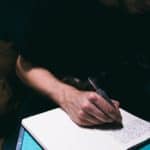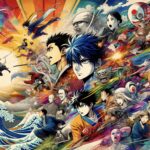Lake Powell
– Non-fiction by Kimi Ceridon –

I wake up alone in Page, Arizona. Today is my fourth day on the road. I am 900 miles into a motorcycle ride from California to Massachusetts – a road trip mostly about avoiding life and responsibility. My eyes blink open just before sunrise; it’s a time called civil twilight. I linger in soft, billowy cotton sheets staring at the ceiling. The windows are open to the crisp air. Outside the slumbering desert echoes with stillness and silence. The only other guest at the bed-n-breakfast occupies a room a floor below and on the other side of the house. The rest of the building is dim and motionless.
In the dining room, I find a note next to a plate of pastries:
There is a bowl of fruit in the fridge.
Help yourself to a yogurt.
Coffee in the thermos may still be warm.
Good luck on your journey. Enjoy the ride.
I ferry luggage to my motorcycle relishing in the uninterrupted solitude. Coffee reheats in the microwave and I pick at the fruit bowl between trips. I smile to myself, grateful that I can slip away without engaging in idle chit-chat, superficial niceties, and discussions of travel plans. I want to exit as if I am a cowboy in a saloon finishing up her business. She claps her hat to her head and tips the brim as she leaves. “Thank you kindly,” she nods to all and no one, before vanishing in a trail of dust, leaving the ghost of her memory. I blame the desert for turning my thoughts into western movie scenes.
The city of Page sleeps as I slide my leg over my motorcycle. The sun crowns over the horizon and sets the desert aglow. Before departing Page, I want to see the sunrise, so I ride to a pull-out that overlooks Lake Powell. Familiarity tugs at the hairs on my neck as I dismount my motorcycle, pull off my helmet, and stand alone at the overlook.
This massive lake formed when the Glen Canyon Dam was built across the Colorado River in 1963. The river used to flow freely from the top of Colorado’s Rocky Mountains through Arizona and into the Gulf of California. Now, the water is high up on the canyon walls well above the original riverbanks. The humanmade lake is 186 miles long, snaking through arid, parched earth from Utah into Arizona.
My family took road trips to the lake some summers to vacation when I was a kid. We filled a boat with gear and towed it behind our Chevrolet Blazer. The boat either stayed anchored near the campground or carried my family around the lake, sometimes with my mom in tow on water skis or one of us kids clinging to an intertube. I know these details, but I have little memory of those trips. I don’t know if we drove to Page or another town with a marina. The direct route from my childhood home east of Denver to any of the marinas is west on Interstate 70, a highway that climbs over the Rockies and passes through the Eisenhower Tunnel, the Interstate Highway System’s longest through-mountain tunnel. The route takes 10 hours, and the road steeply climbs or descends as it traverses the mountains. My parents could have chosen a longer route on scenic byways. I can’t say for sure they didn’t, but I remember taking long road trips and staring out of the backseat window mesmerized by the tunnel’s fluorescent lights.
I texted my brother not long ago to ask if he knew if we camped near Page during those vacations. “Sure, that seems right,” he said, then added, “I don’t know, maybe.” His brevity indicated he wasn’t interested in digging up the details. I wasn’t sure I wanted to know them either.
After my mother died, I found a four-by-four glossy image of us at Lake Powell in a disorganized jumble of photos. The print is hundreds of miles away in a closet in Massachusetts, but I can conjure the complete image from memory.
My father probably took the photo with a 110-millimeter Instamatic camera. The same oranges and yellows of the sunrise before me now fill the grainy photograph. My mom, my sister, my brother, and I are posed in the center. Mom’s long braid hangs over her shoulder. She is wearing swimsuit decorated with flowers and big, plastic-rimmed glasses hide her eyes. Her tanned arms wrap across my little sister and under her diapered bottom. Caught mid-giggle, my sister is chubby and tanned in a sundress with a ribbon in her hair. My older brother stands in front of Mom’s right hip. His head of black hair hovers at Mom’s shoulder while his white sneakers anchor him to the rock. He is physically there, but he has a far-away, wandering look indicates. I am to his left. My hair is braided, like my Mom’s, but it’s dark brown contrasts with her golden locks. I wear a string bikini and am smirking at the camera with my left fist punching my sassily popped hip. I have the care-free confidence of a five-year-old. A care-free confidence my adult self is incapable of conjuring. Behind us, Lake Powell’s glassy surface reflects the purply plateaus on the far shore and the bleached out, hazy sky.
I love this photo. Perhaps I enjoy the idea that I once proudly wore a bikini, unselfconscious about my body, my modesty, or my femininity. I was only five, but for this overweight, 40-something, there is joy in thinking I was once just a carefree blissed-out kid soaking in the sunshine and running around in a comfortable swimsuit. I don’t recall feeling that way, but this photo offers proof that I might have.
I also love it because my father isn’t in it and the four of us look like a content and peaceful family. He must be the one who took it though. Did he capture a happy moment, or was he behind the camera snarling at us?
My memory of trips to Lake Powell is like a quilt full of holes. Swaths of plain white fabric represent where my memory is blank. A few carefully quilted squares interrupt the blankness – the neatly constructed stories I was told about the vacations. They aren’t my memories because I see myself from the outside. Real memories come from the deep recesses of my mind; they are ragged swatches with torn and frayed edges – melancholy first-person memories. Childhood memories follow this patchwork pattern, and I wonder if there is something wrong with me. Am I afflicted with an illness or virus that prevents me from remembering happy memories?
Happy fragments often came from my mom. She tinted memories with nostalgia when she told family stories. Perhaps she hoped to crowd out pain. My sister, the youngest, is certain the family didn’t have any fun after she was born. I think she is afflicted with the same negative memory gene. I don’t always trust my brother’s memories. He was the focus of my father’s fury, and after surviving a childhood filled with bruises, welts and insults he often remembers what he wanted childhood to be like, which is why I didn’t press him about childhood camping.
Now, I am here, covered from head to toe in motorcycle gear and holding a helmet looking at the lakeshore below. I try to summon memories of campfires, hot dogs, and fireflies. My mind pastes the old photograph onto the morning and attempts to bring it to life. But the frame remains static. My younger bikini-clad self doesn’t frolic fearlessly in the water. My brother doesn’t leap from rocks. My sister doesn’t splash in the shallows while my mother tends to camp. None of those moments are real to me.
Instead, my father teases me because I get constipated when we travel – he uses my body’s failure to function as a way to torment me. He buys a new mobile toilet gadget – an unstable folding, aluminum frame attached to a padded toilet seat with a plastic bag dangling beneath to catch shit – to accommodate me every time we go camping. With unnecessary drama, he unpacks the contraptions and displays them at the campsite. I do not use them; there is no privacy. I wouldn’t use them even if there were. It doesn’t matter because he buys the camp toilets for humiliation. He uses my stubborn bowels as a social joke among adults. With a wink and a nod, he chuckles about his prissy little girl.
My father snatches my brother by the arm and drags him across the campsite. He scolds him and stabs a finger into his chest over and over while my brother looks away, dazed and distant. Mom begs him to stop, and I know she is willing my brother to appease him.
My father curses the stupidity of my mother and his 11-year-old son. We are on the lake after dark, and we can’t find our campsite. My sister and I cower in front of the boat. It’s not my father’s fault we are lost, and he reminds them of their incompetence.
My humiliation conjures more moments, not just those from Lake Powell, but moments from my whole childhood.
Fearless bikini girl is gone; a fat teen with permed, frizzy hair replaces her. In his Hawaiian Pidgin English, my father is chanting, “Look at you. You so fat. You so ugly.” Was that his version of reverse psychology to get me to lose weight? Or as an immigrant, did he want an All-American family so much he used cruelty to force us into conformity?
Now, my father chases my prepubescent friends around with his hand bent into a claw. “Watch out. I’m gonna pinch ‘da girls’ butts.” He thinks this is funny and clever. I think my friends won’t hang out at my house anymore.
It is Easter Sunday and father froths, ranting overused insults on repeat, “You look like a bunch of vagabonds. Where’d you learn to be so stupid?” He stabs his finger into our imperfectly combed hair, crooked skirt ruffles, mis-tucked shirts, and other imperfections. Then, despite our tear-reddening faces and fresh bruises, he stands behind the camera and demands a happy family snapshot.
I become aware of the warmth of the rising sun. I stand on a ledge looking down on the luminous lake. The memories to wash over me in a shower of sadness and I feel deflated. Although my sorrow begs me to crawl back into a bed and wallow, I can’t. I am alone, riding a motorcycle across the country.
The sun breaks free from the horizon. I relinquish my search for memories to the desert. My care-free, fearless, bikini-clad, five-year-old self is now a middle-aged woman who carries the burdens of her past. I am shaped by the man behind the camera. I have grieved for the woman with the golden braid. I have marveled at the adults the black-haired boy, and giggling baby have become. And now, I am riding a motorcycle across the country hoping to escape from the memories and pain that haunt me.
I take a deep breathe to still my mind and think about the road ahead. I exhale into the daybreak and pull on my helmet. Recapturing a bit of the calm that swaddled me earlier this morning, I take in the scene one last time and step into my own personal western movie scene. I clap down my visor and kick my leg over my motorcycle, offer a slight nod to no one, but in the direction of the lake. I whisper to myself, “Thank you kindly” as I slip out of Page and vanish in a trail of dust.
About the Author – Kimi Ceridon

Kimi Ceridon is a recovering corporate engineer who left her cubicle behind, went to culinary school, and returned to a childhood passion, writing. She is a Boston-area freelance and technical content writer and has a Master of Science in Mechanical Engineering from the Massachusetts Institute of Technology and a Master of Liberal Arts in Food Studies from Boston University. Currently, she is working on a memoir about how childhood trauma’s lasting effects shaped her adult life. Her personal essays are featured in HerStry, For Women Who Roar, Snapdragon: A Journal of Art and Healing, and The MOON Magazine. Follow her at NoReturnTicket.kceridon.com and @WordsbyKimi on Medium, Facebook, Twitter, Instagram.
Did you like this story by Kimi Ceridon? Then you might also like:
The Identified Patient
What I want the surgeon to know
Sanctuary, and other poems
The Body as Poem
Metaplasia and other poems
This is What Death Does
Where Courage Lives
The Psychiatric Patient Profiled in My Application
Modern Medical Miracles
What the Mirror Says
Writing Myself Alive: An Episodic Poem
Breathing; Love These Lively Things
Oh Emma; Slow Dancing
In the Mirror, For My Mother
Zenstronomy: Zen of Instruction, Godma, Astrophysical Reality
Or, consider the following:

Dreamers Writing Prompt Generator
Experience the power of simplicity with our unique writing prompt generator. Designed for writers who crave spontaneity and surprise, our tool delivers one meticulously crafted prompt at a time.

Top 25 Most Popular Manga Right Now
If you’re searching for the most popular Manga right now, this top 25 list is the ideal starting point, whether a beginner or enthusiast.
Like reading print publications? Consider subscribing to the Dreamers Magazine!